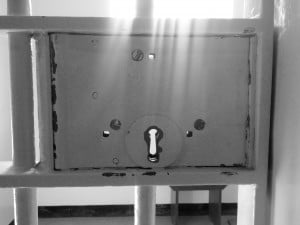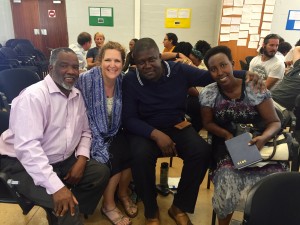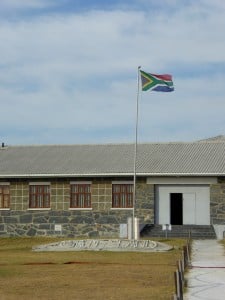From a sermon preached at First Presbyterian Church of Bend, May 29, 2016.
There was a book that was incredibly popular when I was pregnant with my oldest daughter. It was called Baby Wise.
The premise was that all babies should be put on a strict schedule of eating, waking and sleep. It sounded like a winning formula. The baby eats, the baby is awake and then the baby goes to sleep. If the baby cries for a bit, it’s okay. They will quiet down. You could check on them every 15 minutes if you really had to, but the longer you left the baby, the more quickly you would have success. Your baby’s sleep would be under control and as they grew up, they would become model children who knew how to mind their parents, did their chores when they were told and knew they weren’t the center of the world. It all started with an infant that knew how to sleep.
I had a family member who had tried this with her daughter and it had worked great. My competitive ego told me that if she could do it, I could too. I wasn’t going to let my kids run my life and ruin my sleep!
So, we began when we got home from the hospital. Feed, wake, sleep. The feeding part worked well for us. And she seemed a little sleepy after eating, but I was able to keep her up for the most part. And then it was time to lay her down. She cried. We’d go in to check in on her. She cried some more. Chris and I sat on our couch, holding hands, trying to be brave enough and stronger than our baby. She kept crying.
I wish I could tell you that this only went on a day, but in fact, it went on for weeks. I was a wreck. I read Baby Wise over and over. I called friends for advice. I was sure it was my fault that the formulas weren’t working, and in my worst moments, I was angry with my sweet baby girl. Certainly I was doing something wrong.
I am grateful for the moment of clarity I had one day while I was holding my daughter, having exhausted the resources Baby Wise could offer. I realized it was more important that my daughter felt my love and care than that she had perfect sleep habits. Relationship was more important than conformity or being able to brag that she went to sleep on her own.
And so we abandoned Baby Wise and held her until she went to sleep as long as we needed to. Amazing, but now she is now sixteen and doesn’t need to be rocked to sleep. But those moments that she did were some of the best moments of my life and I almost missed them completely.
Losing these precious first weeks of parenthood to shame, blame and guilt is one of the greatest regrets of my life.
How often has the church missed its calling to be the presence of Christ because we made the mistake to think that church is about following the letter of the law rather than following the way of Jesus?
How often have we obsessed about getting it right rather than being right in our soul, mind, and body?
How often have we been a place of judgment rather than a refuge for hurting people?
How often have we worried about whether we or others were fulfilling all the requirements rather than moving towards true belonging to God, ourselves and to community?
As much as my experience in the first weeks of motherhood breaks my heart, the story of the church is even more tragic because so many have been hurt by our missed priorities and many others are still caught in the cycle of shame and blame that the church has put on them.
The Psalms are a treasure trove of internal journeys. Psalm 73 tells the journey of someone who makes the internal journey from being the victim of others’ expectations and external measures of acceptance to knowing their deep worthiness as a child of God. Let’s read Psalm 73 together, listening for the journey of the writer.
Psa. 73 1-3 Truly God is good to the upright,to those who are pure in heart. But as for me, my feet had almost stumbled; my steps had nearly slipped. For I was envious of the arrogant; I saw the prosperity of the wicked.
Okay. Let’s stop there because some of you heard “wicked” and stopped listening because you don’t like the “them/us” language.
And others of you may have been getting revved up… “Yeah! Those people are wicked!” Finally someone is calling it like it is.
Reimagine the polarized language for a moment. We all have looked at others and made them “the wicked”. We have made others the enemy when we see them as the source of our misery. Like this writer, we get caught up in cycles of comparison.
Ps 73:3-14 For I was envious of the arrogant; I saw the prosperity of the wicked. For they have no pain; their bodies are sound and sleek. They are not in trouble as others are;they are not plagued like other people. Therefore pride is their necklace; violence covers them like a garment. Their eyes swell out with fatness; their hearts overflow with follies. They scoff and speak with malice; loftily they threaten oppression. They set their mouths against heaven, and their tongues range over the earth. Therefore the people turn and praise them, and find no fault in them. And they say, “How can God know? Is there knowledge in the Most High?” Such are the wicked; always at ease, they increase in riches. All in vain I have kept my heart clean and washed my hands in innocence. For all day long I have been plagued, and am punished every morning.”
I call this the shame and blame game.
Shame says that it is my fault. Blame says it’s the other’s fault. They are two sides of one coin and within seconds we flop between the two of them.
We look out and around us for validation, getting caught in a game we can never win. A game that plays by the rule that it is perfection and invulnerability that make us strong. The strategy of the shame and blame game is comparison. The writer looks at the other and sees they have everything easy. Meanwhile, the writer’s own soul feels exposed and tortured.
Are you familiar with the shame and blame game?
It is possible to spend an entire life playing this game.
Listen to how our writer finds a way out…
Psa. 73:15-20 If I had said, “I will talk on in this way,” I would have been untrue to the circle of your children. But when I thought how to understand this, it seemed to me a wearisome task, until I went into the sanctuary of God; then I perceived their end. Truly you set them in slippery places; you make them fall to ruin. How they are destroyed in a moment, swept away utterly by terrors! They are like a dream when one awakes; on awaking you despise their phantoms.
The writer gets tired of playing the game of shame and blame and enters a different space – the sanctuary of God. It is there that he remembers invulnerability is always an an illusion. Those that torture him are caught in their own terrors and are likely even more vulnerable because of the veneer of invulnerability.
Then the shift begins.
Psa. 73:21 When my soul was embittered, when I was pricked in heart, I was stupid and ignorant; I was like a brute beast toward you. Nevertheless I am continually with you; you hold my right hand. You guide me with your counsel, and afterward you will receive me with honor. Whom have I in heaven but you? And there is nothing on earth that I desire other than you. My flesh and my heart may fail, but God is the strength of my heart and my portion forever. Indeed, those who are far from you will perish; you put an end to those who are false to you. But for me it is good to be near God; I have made the Lord GOD my refuge, to tell of all your works.
You have always been with me. God. You know me. My vulnerability and weakness is the space where I find you and where I am fully seen. Where I find belonging.
I wish vulnerability wasn’t the answer. I wish we could get to belonging without it but we can’t. The path out of the shame and blame game and into belonging is vulnerability. We have to come to the ground of our weakness and tell the truth about where and how we are living to find that space we all long for – an internal knowing that we are loved and valued and belong.
Belonging is a paradox. It requires that we are seen and known but once we know we are seen, we are no longer desperate to be seen and known. We are free to love others without agenda. We stop comparing ourselves to others. We no longer need to judge. We are grounded in love and live in love.
The poet Mary Oliver puts it this way: “Love yourself. Then forget it. Then love the world.”
I know there are more grandiose examples of how this has worked, but I’d like to offer a simple and small shift I have experienced in recent months. For those who know me here at First Pres, where I am at home, you may not realize what an introvert I am, but put me in a group of strangers and I get really quiet. In a new group, I internally begin to play the shame and blame game.
Shame: “If only I was smarter, had read more, had more letters behind my name, was prettier, then I wouldn’t feel so out of place.”
Blame: “When will these people stop talking? They are all just out for themselves. Why did they say THAT?”
When I shared the paralysis I experience between blame and shame, a mentor and friend invited me to remember that I’m an introvert. She kindly wondered what would happen if instead of going to shame and blame, I went to curiosity and compassion.
What if I allowed myself to be quiet until I’m ready to speak?
What if I wondered about others instead of judging them?
As I’ve practiced these things, my experience in groups has changed. I have a different understanding of myself and why new groups can be difficult for me. I have moved from feeling ashamed for my shyness and blaming everyone else for my insecurity into space of quiet wonder. And once I experienced this belonging – even to my own self – I no longer needed to find it from others in the group. I could belong to myself the way God has made me.
When we are seen and known, we are freed to see and know others. Belonging is a place of great freedom.
The writer of Psalm 73 had a practice of going into the sanctuary – whatever form that took for him.
And we also need communities of belonging to remind, reset and reaffirm that we belong to God. We need spaces to practice being vulnerable.
We need practices of belonging that take us off the hamster wheel of busyness and make time for connection and hospitality.
We need practices of belonging such as eating with each other, looking others in the eyes and allowing ourself to be seen.
We need practices of belonging such as silence – the comfort of not having to speak or think and also the awkwardness that it brings as we are forced to take a step deeper into our own soul.
So, why church?
Belonging is not a place or a building or a theological construct but a journey we are on to know and be known.
We need practices, places and people that don’t require our worthiness. We need others to remind us that our life is not a game of shame and blame but an invitation to belonging. We need to be invited over and over to be active participants in our life, the life of the world and the belonging life of God and that it is in our weakness we are made strong.
When we refuse to play the shame and blame game, we will make church a place of belonging.
“Love yourself. Then forget it. Then love the world.”











